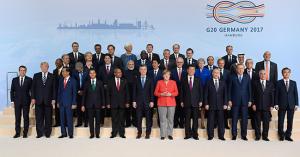Singapore’s View on the G20 Summit 2017
Single title
Singapore’s Focus
During the summit, Singapore’s Prime Minister (PM) Lee Hsien Loong delivered two speeches. His remarks on the opening day of the summit on 7 July focused much on the current state of international trade. Despite creating prosperity and growth, PM Lee underlined that the benefits of trade need to be redistributed more equally. Due to this current unequal distribution, trade is blamed for painful domestic disruptions. These challenges would be usual pluses and minuses and it is the responsibility of the respective government to balance them through domestic policies and adjustment programmes. PM Lee emphasized that anti-trade sentiments could hurt livelihoods and prosperity of millions which is why multi-lateral trade models need to be supported. While some big countries move to bilateral routes on trade matters, Lee highlighted that smaller countries strongly prefer the multilateral approach since they require a collective voice to be heard. It is, therefore, important that major trading countries (such as the European Union (EU)) have continued to support the multilateral model which helps to balance trade-offs and creates win-win situations. Lee praised this support as politically courageous and essential in preventing a tit-for-tat downward spiral.
The Prime Minister also spoke at a working lunch on digitalization, women’s empowerment and employment on 8 July. In these remarks, PM Lee addressed questions on how governments can shape digitalization. This would require a positive mindset and a willingness to embrace change in order to harvest the full potential of this development. Acknowledging that fears persist, especially concerning job loss and the disruption of traditional industries through the growing importance of the sharing economy, Lee emphasized that governments can help companies and workers to adapt to this new normal. Firstly, they need to set up a supportive environment, frameworks and rules. Secondly, workers as well as students need to be equipped with the necessary skills and displaced workers require training. Finally, leaders must support industries in changing their way of thinking and doing business, but must also ensure a balance between new and old players. The importance of this topic was reflected in the Summit Declaration which includes steps on digital literacy and skills.
Bilateral Cooperation
Besides the broader discussion in the G20 group, Singapore believes that the summit proves very useful as it provides an opportunity to meet other world leaders on the sidelines of the meeting. Singapore made much use of this as the delegation arranged bilateral meetings with German Chancellor Angela Merkel, Chinese President Xi Jinping, US President Donald J. Trump, Japanese Prime Minister Shinzo Abe, Argentine President Mauricio Macri, Dutch Prime Minster Mark Rutte and leaders of the EU – Donald Tusk as well as Jean-Claude Juncker.
Germany and Singapore have a very close partnership. In their meeting Merkel and Lee identified future areas of cooperation such as research and development for industry 4.0, financial technology and sports. The leaders underlined that both countries are like-minded and have a shared positive outlook on free international trade, multilateralism, rule of law and sustainable development. They agreed to work on an enhanced Defence Cooperation Agreement. In addition, Singapore’s Cyber Security Agency and the German Federal Foreign Office signed a Joint Statement on Cybersecurity Cooperation including information exchange, sharing of best practices, joint training and research. Both leaders emphasized their support for the EU-Singapore Free Trade Agreement (EUSFTA) as it would send a strong signal for free trade and prepare for a future EU-ASEAN FTA.
The first bilateral meeting between PM Lee and President Trump was long anticipated. Both had two phone calls after the elections, but Singapore was quick to express its regrets after the US withdrawal from the Transpacific Partnership (TPP) in January 2017. Ministries, business representatives, academics and the media openly showed the difference in perspectives by emphasizing that multilateral trade agreements will benefit all and TPP could also be implemented without the US. It was even highlighted that this strategic vacuum could be filled by non-US-led initiatives such as the Regional Comprehensive Economic Partnership (RCEP) or the Free Trade Area of the Asia-Pacific. In light of this clear difference in the strategic approach, the meeting went smoothly with the leaders exchanging views on regional and international developments. They praised the excellent ties and commitment to work together. PM Lee also accepted an invitation to visit Washington DC by the end of this year.
Public Perception
The reports in the local media in Singapore were, however, more critical of the G20-Summit. While reports acknowledged that the leaders agreed to keep markets open and fight protectionism, they highlighted the open dissonance on climate change and the inclusion of fossil fuels in the finale declaration which marks a breaking with the Summit’s tradition. Singapore’s highest-selling newspaper, The Straits Times, described it even as the most fractious and fragmented summit yet with a fragile unity reflected in the Summit Declaration containing many concessions to the new US administration as well as the persistence of at least underlying bilateral tensions among the members. The newspaper identified the recognition of Trump’s withdrawal from the Paris Agreement and acknowledgement of unfair trade practices, which may justify the use of legitimate protective trade defence instruments, as a step back from the momentum created at the G20 meeting in London 2009. Interestingly, the media in Singapore did not report much on the riots that occurred during the summit. The facts on the clashes were mentioned, but the focus of the reporting was on the content of the G20-Summit and the various bilateral meetings of the leaders.



